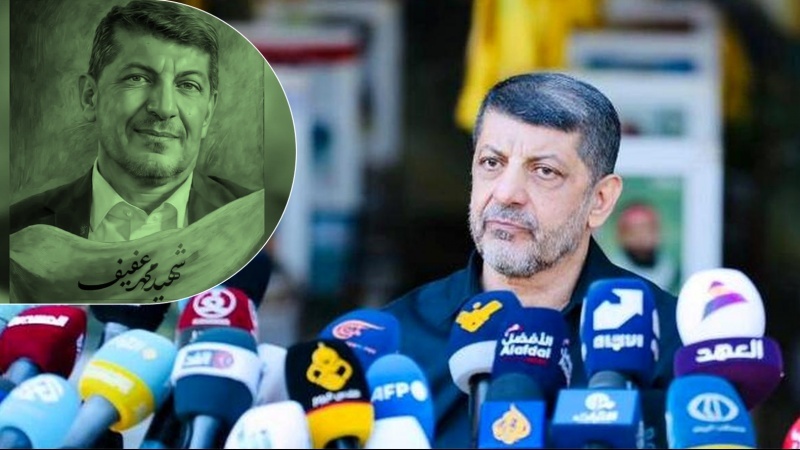AhlulBayt News Agency: An expert on international affairs and a user of the X social network, considered the Zionist regime's action in martyring Mohammad Afif al-Nabulsi, the head of media relations of Hezbollah, as a sign of the painfulness of Hezbollah's media operations against this regime.
Mohammad Afif al-Nabulsi, the head of media relations and official spokesperson of Hezbollah was martyred in the Zionist regime's attacks on Sunday.
Martyr Mohammad Afif al-Nabulsi, known as "Hajj Mohammad" in Hezbollah, joined the movement in 1983 and was one of the founding members of Hezbollah.
He played an effective role in the structure of the Hezbollah movement from the beginning and gradually became one of the key figures of Hezbollah.
Martyr Afif was appointed as the head of media relations of Hezbollah in 2014 and played an important role in conveying messages and media coordination of the party at the domestic and international levels, especially during critical times and conflicts with the Zionist regime.
Martyr Afif announced Hezbollah's strong support for the Palestinian resistance after the Zionist regime's crimes after October 7, 2023, and emphasized that this group will continue to stand alongside Muslim nations.
The head of media relations of Hezbollah has been holding daily press conferences with journalists from various media outlets in recent weeks, especially after the martyrdom of Seyyed Hassan Nasrallah, the secretary-general of the movement, and answering their questions.
Martyr Afif recently challenged the Zionist regime's threats in a press conference, saying: "We are not afraid of attacking, let alone threatening. Our will is firm and the resistance is standing and steadfast."
The martyrdom of Mohammad Afif by the Zionist regime was met with widespread reactions from Iranian users of the X network, including prominent figures.
Mohammad Saeid Ahadian, the political and media advisor to the Speaker of the Iranian Parliament, reacted to the martyrdom of Mohammad Afif al-Nabulsi, attributing the expansion of the resistance discourse in the region and the world to a decade of his tireless efforts within Hezbollah.
Ahadian added: "Today, Hezbollah is no longer limited to Lebanon, and the flag of Hezbollah is proudly raised in various parts of the world."
Seyyed Mohammad Hosseini, the former Minister of Culture and Islamic Guidance of Iran, and Mehdi Torabi, an Iranian football player, were among the other prominent Iranian users who reacted to the martyrdom of the head of media relations and official spokesperson of Hezbollah.
Hosseini described Martyr Mohammad Afif al-Nabulsi as an unwavering warrior, a powerful voice, and a narrator of the resistance of Lebanon’s brave men and women.
Mehdi Torabi, an Iranian footballer, wrote on X: "With his voice, he was the narrator of the Zionist regime's crimes."
In another message on the X social network, Mohammad Mehdi Rahimi, an expert on international affairs, wrote: "The Zionist regime's repeated actions to assassinate Mohammad Afif show the painfulness of Hezbollah's media operations against this regime."
Rahimi added: "The Islamic resistance of Lebanon has always considered a special place for the media, and as its structure developed, its media understanding and activism in this field expanded."
/129
Mohammad Afif al-Nabulsi, the head of media relations and official spokesperson of Hezbollah was martyred in the Zionist regime's attacks on Sunday.
Martyr Mohammad Afif al-Nabulsi, known as "Hajj Mohammad" in Hezbollah, joined the movement in 1983 and was one of the founding members of Hezbollah.
He played an effective role in the structure of the Hezbollah movement from the beginning and gradually became one of the key figures of Hezbollah.
Martyr Afif was appointed as the head of media relations of Hezbollah in 2014 and played an important role in conveying messages and media coordination of the party at the domestic and international levels, especially during critical times and conflicts with the Zionist regime.
Martyr Afif announced Hezbollah's strong support for the Palestinian resistance after the Zionist regime's crimes after October 7, 2023, and emphasized that this group will continue to stand alongside Muslim nations.
The head of media relations of Hezbollah has been holding daily press conferences with journalists from various media outlets in recent weeks, especially after the martyrdom of Seyyed Hassan Nasrallah, the secretary-general of the movement, and answering their questions.
Martyr Afif recently challenged the Zionist regime's threats in a press conference, saying: "We are not afraid of attacking, let alone threatening. Our will is firm and the resistance is standing and steadfast."
The martyrdom of Mohammad Afif by the Zionist regime was met with widespread reactions from Iranian users of the X network, including prominent figures.
Mohammad Saeid Ahadian, the political and media advisor to the Speaker of the Iranian Parliament, reacted to the martyrdom of Mohammad Afif al-Nabulsi, attributing the expansion of the resistance discourse in the region and the world to a decade of his tireless efforts within Hezbollah.
Ahadian added: "Today, Hezbollah is no longer limited to Lebanon, and the flag of Hezbollah is proudly raised in various parts of the world."
Seyyed Mohammad Hosseini, the former Minister of Culture and Islamic Guidance of Iran, and Mehdi Torabi, an Iranian football player, were among the other prominent Iranian users who reacted to the martyrdom of the head of media relations and official spokesperson of Hezbollah.
Hosseini described Martyr Mohammad Afif al-Nabulsi as an unwavering warrior, a powerful voice, and a narrator of the resistance of Lebanon’s brave men and women.
Mehdi Torabi, an Iranian footballer, wrote on X: "With his voice, he was the narrator of the Zionist regime's crimes."
In another message on the X social network, Mohammad Mehdi Rahimi, an expert on international affairs, wrote: "The Zionist regime's repeated actions to assassinate Mohammad Afif show the painfulness of Hezbollah's media operations against this regime."
Rahimi added: "The Islamic resistance of Lebanon has always considered a special place for the media, and as its structure developed, its media understanding and activism in this field expanded."
/129

